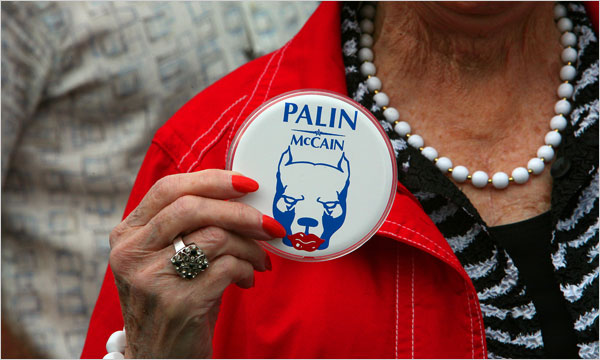 On a beaucoup sous-estimé chez nous le potentiel répulsif de Sarah Palin, la co-listière républicaine à l'élection présidentielle US - et ne l'oublions pas, la potentielle présidente des USA en cas de décès prématuré du vieux Mc Cain... Pour l'Américain moyen, qui vient de subir plusieurs années catastrophiques de Bill Clinton, suivies d'autant de catastrophes avec Georges Walker Bush, il fallait un changement. Et le "pitt bull à rouge à lèvre" n'était pas vraiment ce qu'il espérait pour incarner un changement. Les ex-démocrates devenus "néo-conservateurs" ont montré leurs limites en très peu de temps, en mettant le monde à feu et à sang. Avoir une "dure de chez dur," foldingue et hargneuse, comme potentiel dirigeant du pays, ça n'a fait rêver personne. Exit donc le choix républicain, à regret d'ailleurs pour nombre de ses électeurs, tant Mc Cain incarnait leurs espoirs. Et avait leur confiance.
On a beaucoup sous-estimé chez nous le potentiel répulsif de Sarah Palin, la co-listière républicaine à l'élection présidentielle US - et ne l'oublions pas, la potentielle présidente des USA en cas de décès prématuré du vieux Mc Cain... Pour l'Américain moyen, qui vient de subir plusieurs années catastrophiques de Bill Clinton, suivies d'autant de catastrophes avec Georges Walker Bush, il fallait un changement. Et le "pitt bull à rouge à lèvre" n'était pas vraiment ce qu'il espérait pour incarner un changement. Les ex-démocrates devenus "néo-conservateurs" ont montré leurs limites en très peu de temps, en mettant le monde à feu et à sang. Avoir une "dure de chez dur," foldingue et hargneuse, comme potentiel dirigeant du pays, ça n'a fait rêver personne. Exit donc le choix républicain, à regret d'ailleurs pour nombre de ses électeurs, tant Mc Cain incarnait leurs espoirs. Et avait leur confiance.Or, Hilary Clinton "mangeuse à tous les rateliers" ayant été évincée par Obama, côté démocrate, l'épouvantail avait disparu - elle vaut largement Sarah Palin, l'inculture en moins.
Car côté républicain, ils ont fait une gaffe monumentale. Sarah Palin, c'est GW Bush au féminin. Aussi niaise, inculte, inexpérimentée, agressive, et dangereuse à la fois pour son pays et pour le restant du monde. Ca, ils n'en voulaient plus. Qui pourrait les en blâmer?!
Maintenant, le programme socialiste de Barrack Obama... ils connaissent! Ils ont eu Clinton & Carter à le leur proposer, au cours des 30 dernières années. Et les gouffres financiers de l'État fédéral américain, c'est là et pas ailleurs qu'ils trouvent leur origine. Les calamiteuses administrations Bush n'ont fait qu'amplifier les dégâts déjà présents.
Il aura donc fallu que les Républicains soient assez demeurés - on ne trouve pas d'autre excuse - pour imposer au candidat indépendant John McCain une co-listière bête et méchante, pour permettre à Obama d'être élu avec un programme dont certains points ont déjà montré leurs effets nocifs sur leur pays auparavant!
Et nous, européens? Si on en croit nos politiciens et médias - de "droite" comme de "gauche" - Barrack Obama est "brillant" (Rama Yade), compétent, etc etc. Les lauriers lui étaient tressés avant même son élection. Mais quand on reprend ses propres discours et son programme, on s'aperçoit qu'il n'a pas l'intention de réparer toutes les horreurs du passé de son pays à notre encontre. Nulle part on n'a lu de sa plume l'intention de démonter Camp Bonsteel, dans la province serbe du Kosovo, et d'ainsi rendre à la Serbie le territoire qui lui appartient légitimement et non pas aux maffias installées par l'administration Bush & l'ONU & l'OTAN. Nulle part on n'a lu son intention de démanteler les installations militaires d'occupation que ses prédécesseurs ont installées dans des pays aux "pouvoirs démocratiques" d'origine communiste largement corrompus - Bulgarie, Roumanie, Pologne, etc - ni en Allemagne, Belgique, Pays-Bas, etc. La calamiteuse "guerre pour le pétrole" lancée par Bill Clinton contre l'Irak (n'oublions pas qui a fait quoi..), Obama ne parle pas non plus d'y mettre un rapide terme, et de réparer les dégâts. Et la réinstallation des barons de la drogue en Afghanistan, que les USA ont permise, il n'en pipe mot. Alors, Barrack Obama, un grand démocrate dans le sens athénien du terme, ou une esbrouffe de plus, permise par les lobbies militaro-économiques afin de préserver leurs capitaux? Nous nous permettons de laisser la réponse en suspens. Contrairement à J-J Rousseau, qui disait qu'il fallait évacuer les faits (principe marxiste avant la lettre), nous attendrons les faits pour juger. Mais avec toujours la méfiance. Jamais baisser la garde. Les USA ont vendu les Liberty Ships aux Anglais, et en même temps, financé les torpilles des U-Boot pour couler ces cargos; et le grand-père de GW Bush n'était pas le seul dans ce démoniaque commerce. Les USA vivent pour leur propre intérêt. Il est rarissime qu'il corresponde à l'intérêt des nations d'Europe, de l'Atlantique à l'Oural. Il est VITAL que nous nous en souvenions.
La Rédaction
http://topics.nytimes.com/top/reference/timestopics/people/p/sarah_palin/index.html
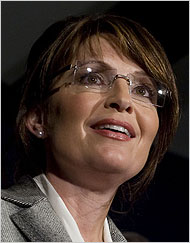 Stephen Crowley/The New York Times
Stephen Crowley/The New York TimesBiography
Full Name: Sarah Heath Palin
Party: Republican
Political Office: Governor of Alaska, elected 2006; mayor of Wasilla, Alaska, 1996-2002; Wasilla City Council, 1992-1996
Business/Professional Experience: Television sports reporter, 1987-1989; Co-owner of a commercial fishing operation, 1988-2007; owner, sport vehicle rental business, 1994-1997; chairwoman, Alaska Oil and Gas Conservation Commission, 2003-2004
Date of Birth: February 11, 1964
Place of Birth: Sandpoint, Idaho
Education: B.S., University of Idaho, 1987
Spouse: married Todd Palin, 1988
Children: Sons Track, born 1989, and Trig Paxson Van, born 2008; daughters Bristol, born 1990; Willow, born 1994 and Piper, born 2001
Religion: Protestant (nondenominational)
Home: Wasilla, Alaska
In a state dominated by the same party – and in many cases the same people – virtually since its inception, Sarah Palin is at the vanguard of a new generation of Alaska Republicans with a reformist bent. The self-described "hockey mom" ousted the incumbent governor in the 2006 primary, and she is both the youngest person and the first woman to serve in the post in Alaska. Senator John McCain, the presumptive presidential nominee of the Republican Party, drafted her as his running mate on Aug. 29, 2008.
After overseeing significant increases in both population and spending as mayor of her home town of Wasilla, Alaska, Ms. Palin started accusing high-ranking members of her own party of ethical lapses, leading to some resignations. Finally, in 2006, she took on Gov. Frank H. Murkowski. Running on her usual message of a "new face," Ms. Palin beat the incumbent governor in the G.O.P. primary. Her outsider status helped her buck a national trend of Democratic victories in the general election.
Since taking office, Ms. Palin has raised taxes on oil companies' revenue from the state – seen as a risky move by some observers – and crafted a deal with a Canadian firm to potentially build a long-sought natural gas pipeline. But she has also come under scrutiny: In July 2008, an investigation was opened into whether Ms. Palin had tried to use her office to get her sister's ex-husband fired as a state trooper.
With five children, Ms. Palin's family is a central part of her public persona. Her oldest son, Track, is in the Army and slated for deployment to Iraq, while her youngest, Trig Paxson Van, has Down syndrome. A few days after joining the McCain ticket, she and her husband, Todd, also disclosed that their teenage daughter was five months pregnant. They said Bristol would keep the baby and marry the father.
Ms. Palin, a former local beauty queen born in Idaho and raised in Alaska, has attracted monikers ranging from "Sarah Barracuda" (for her adversarial style) to "Saint Sarah." From her support for gun rights and oil drilling to her opposition to abortion, Ms. Palin is popular with conservatives. In adding Ms. Palin to the ticket, the McCain campaign hopes to compete for those seeking the change Senator Barack Obama offers and placate social conservatives while maintaining his own reputation for independence from G.O.P. orthodoxy.
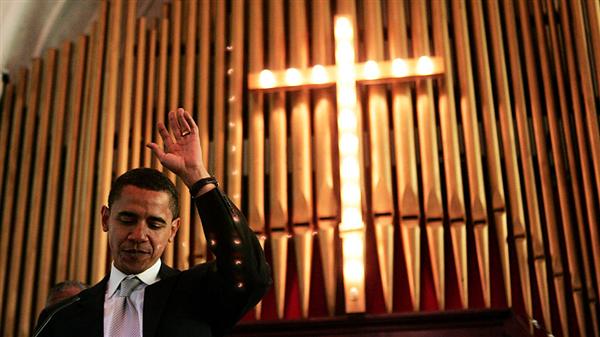 Le protestantisme, forme de christianisme à géométrie variable, qui permet le mariage homo et l'avortement tout en jurant ses grands dieux d'être fidèle à la Bible qui interdit les 2, est la religion de tous ces candidats. C'est celle aussi utilisée pour justifier les diverses "croisades" de Clinton & Bush (père & fils). Obama va-t'il prêcher un "nouvel évangile politico-religieux" au monde à coups de missiles ou va-t'il se concentrer à réparer les dégâts de ses prédécesseurs, démocrates comme républicains? C'est la question qui intéresse toute la planète.
Le protestantisme, forme de christianisme à géométrie variable, qui permet le mariage homo et l'avortement tout en jurant ses grands dieux d'être fidèle à la Bible qui interdit les 2, est la religion de tous ces candidats. C'est celle aussi utilisée pour justifier les diverses "croisades" de Clinton & Bush (père & fils). Obama va-t'il prêcher un "nouvel évangile politico-religieux" au monde à coups de missiles ou va-t'il se concentrer à réparer les dégâts de ses prédécesseurs, démocrates comme républicains? C'est la question qui intéresse toute la planète.
After eight years of Republican rule – during which the rich happily trampled on the poor in their rush to the Wall Street trough – the notion that someone would organize the poor to assert their rights struck both Giuliani and his Republican audience as simply funny.
If Republicans fail today in their efforts to keep the poor from voting, Barack Obama will end up president of the United States. The fact that his early instincts led him to try to organize the powerless rather than hop onto the corporate ladder suggests a taste for meaningful democracy. This has stirred hopes that Obama may be the transformative leader so many – in the U.S. and around the world – have yearned for.
Obama has shown little inclination to alter the dismal pattern of U.S. foreign policy. But he does seem potentially poised to do something else of great importance – to begin reversing the immense damage done by the neo-conservative revolution launched several decades ago by Ronald Reagan and Margaret Thatcher.
In fact, conditions for an assault on this vicious economic revolution could not be better. The disastrous administration of George W. Bush – culminating in the current financial meltdown – has exposed the deep flaws of unbridled capitalism.
Turning the ship around won't be easy. Pushed by powerful interests, neo-conservative policies – tax cuts, social spending cuts, privatization, deregulation – have become the basic tool kit of Anglo-American governments in recent years, including, of course, Canadian governments.
Indeed, the Reagan-Thatcher model has taken on the authority of a religion – "the market as god," as Harvard theologian Harvey Cox has dubbed it. Its core belief holds that society is an economic jungle where all just advance their own interests. Shunted aside has been the notion of society as a co-operative effort in which everyone has certain rights as well as responsibilities, and that together we work toward a "common good."
Obama has reintroduced the language of the "common good" and "social responsibility," and he's made some policy promises – on taxes, social spending and regulation – that lead in that direction.
But whether this opportune moment is truly seized will depend on more than Obama's inclinations. It's one thing to have the democratic instincts of a community organizer. It's quite another to have the fortitude – even in the Oval Office – to resist the demands of the powerful, with their control of the media and the economy.
Ultimately, rolling back the neo-conservative revolution will depend on the ability of the public to keep the heat on Obama by organizing campaigns, by pressuring elected officials, by marching in the streets if necessary. Only by providing a counterweight to the power of the elite can ordinary citizens compel Obama to deliver on the extraordinary expectations he's aroused.
Here in Canada, the moment is no less ripe.
In the federal election last month, a mere 37.6 per cent of Canadians voted for the winning Conservative party, which remains deeply mired in the Reagan-Thatcher ideas – ideas that are hopefully soon to be out of favour in the White House.
If ever there was a moment for people everywhere to begin pushing back against the neo-conservative edifice that has so damaged the common good, that moment begins after the celebrations tonight.
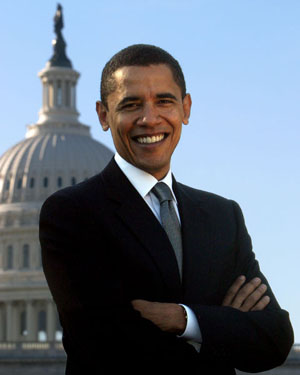 Les États-Unis d'Amérique nous ont "habitués" à subir leur vision manichéenne - tout est blanc ou noir, avec eux ou contre eux. Ce couple noir-blanc / Obama - White House va-t'il changer la donne? On se permettra les plus grands doutes. Et tant mieux, quelque part, si nous nous serons trompés!
Les États-Unis d'Amérique nous ont "habitués" à subir leur vision manichéenne - tout est blanc ou noir, avec eux ou contre eux. Ce couple noir-blanc / Obama - White House va-t'il changer la donne? On se permettra les plus grands doutes. Et tant mieux, quelque part, si nous nous serons trompés!En tout cas, vu tout ce qui précède, il était inévitable que Barrack Obama soit élu...
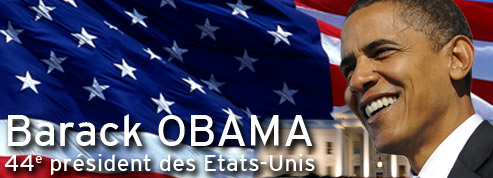
Obama Elected President as Racial Barrier Falls
http://www.nytimes.com/2008/11/05/us/politics/05elect.html
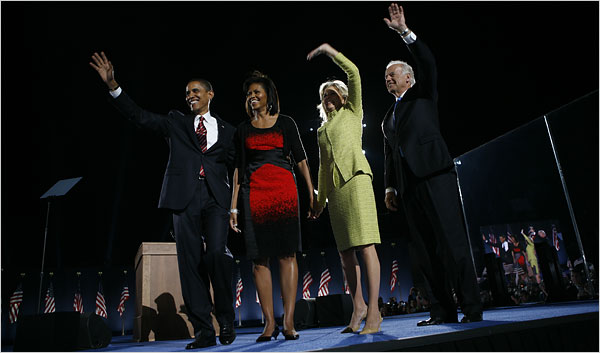 Damon Winter/The New York Times
Damon Winter/The New York TimesSenator Barack Obama with his wife, Michelle, and Senator Joseph R. Biden Jr. with his wife, Jill, in Chicago on Tuesday night.
By ADAM NAGOURNEY
Published: November 4, 2008
Barack Hussein Obama was elected the 44th president of the United States on Tuesday, sweeping away the last racial barrier in American politics with ease as the country chose him as its first black chief executive.
The election of Mr. Obama amounted to a national catharsis — a repudiation of a historically unpopular Republican president and his economic and foreign policies, and an embrace of Mr. Obama’s call for a change in the direction and the tone of the country.
But it was just as much a strikingly symbolic moment in the evolution of the nation’s fraught racial history, a breakthrough that would have seemed unthinkable just two years ago.
Mr. Obama, 47, a first-term senator from Illinois, defeated Senator John McCain of Arizona, 72, a former prisoner of war who was making his second bid for the presidency.
To the very end, Mr. McCain’s campaign was eclipsed by an opponent who was nothing short of a phenomenon, drawing huge crowds epitomized by the tens of thousands of people who turned out to hear Mr. Obama’s victory speech in Grant Park in Chicago.
Mr. McCain also fought the headwinds of a relentlessly hostile political environment, weighted down with the baggage left to him by President Bush and an economic collapse that took place in the middle of the general election campaign.
“If there is anyone out there who still doubts that America is a place where all things are possible, who still wonders if the dream of our founders is alive in our time, who still questions the power of our democracy, tonight is your answer,” said Mr. Obama, standing before a huge wooden lectern with a row of American flags at his back, casting his eyes to a crowd that stretched far into the Chicago night.
“It’s been a long time coming,” the president-elect added, “but tonight, because of what we did on this date in this election at this defining moment, change has come to America.”
Mr. McCain delivered his concession speech under clear skies on the lush lawn of the Arizona Biltmore, in Phoenix, where he and his wife had held their wedding reception. The crowd reacted with scattered boos as he offered his congratulations to Mr. Obama and saluted the historical significance of the moment.
“This is a historic election, and I recognize the significance it has for African-Americans and for the special pride that must be theirs tonight,” Mr. McCain said, adding, “We both realize that we have come a long way from the injustices that once stained our nation’s reputation.”
Not only did Mr. Obama capture the presidency, but he led his party to sharp gains in Congress. This puts Democrats in control of the House, the Senate and the White House for the first time since 1995, when Bill Clinton was in office.
The day shimmered with history as voters began lining up before dawn, hours before polls opened, to take part in the culmination of a campaign that over the course of two years commanded an extraordinary amount of attention from the American public.
As the returns became known, and Mr. Obama passed milestone after milestone —Ohio, Florida, Virginia, Pennsylvania, New Hampshire, Iowa and New Mexico — people rolled spontaneously into the streets to celebrate what many described, with perhaps overstated if understandable exhilaration, a new era in a country where just 143 years ago, Mr. Obama, as a black man, could have been owned as a slave.
For Republicans, especially the conservatives who have dominated the party for nearly three decades, the night represented a bitter setback and left them contemplating where they now stand in American politics.
Mr. Obama and his expanded Democratic majority on Capitol Hill now face the task of governing the country through a difficult period: the likelihood of a deep and prolonged recession, and two wars. He took note of those circumstances in a speech that was notable for its sobriety and its absence of the triumphalism that he might understandably have displayed on a night when he won an Electoral College landslide.
“The road ahead will be long, our climb will be steep,” said Mr. Obama, his audience hushed and attentive, with some, including the Rev. Jesse Jackson, wiping tears from their eyes. “We may not get there in one year or even one term, but America, I have never been more hopeful than I am tonight that we will get there. I promise you, we as a people will get there.” The roster of defeated Republicans included some notable party moderates, like Senator John E. Sununu of New Hampshire and Representative Christopher Shays of Connecticut, and signaled that the Republican conference convening early next year in Washington will be not only smaller but more conservative.
Mr. Obama will come into office after an election in which he laid out a number of clear promises: to cut taxes for most Americans, to get the United States out of Iraq in a fast and orderly fashion, and to expand health care.
In a recognition of the difficult transition he faces, given the economic crisis, Mr. Obama is expected to begin filling White House jobs as early as this week.
Mr. Obama defeated Mr. McCain in Ohio, a central battleground in American politics, despite a huge effort that brought Mr. McCain and his running mate, Gov. Sarah Palin of Alaska, back there repeatedly. Mr. Obama had lost the state decisively to Senator Hillary Rodham Clinton of New York in the Democratic primary.
Mr. McCain failed to take from Mr. Obama the two Democratic states that were at the top of his target list: New Hampshire and Pennsylvania. Mr. Obama also held on to Minnesota, the state that played host to the convention that nominated Mr. McCain; Wisconsin; and Michigan, a state Mr. McCain once had in his sights.
The apparent breadth of Mr. Obama’s sweep left Republicans sobered, and his showing in states like Ohio and Pennsylvania stood out because officials in both parties had said that his struggles there in the primary campaign reflected the resistance of blue-collar voters to supporting a black candidate.
“I always thought there was a potential prejudice factor in the state,” Senator Bob Casey, a Democrat of Pennsylvania who was an early Obama supporter, told reporters in Chicago. “I hope this means we washed that away.”
Mr. McCain called Mr. Obama at 10 p.m., Central time, to offer his congratulations. In the call, Mr. Obama said he was eager to sit down and talk; in his concession speech, Mr. McCain said he was ready to help Mr. Obama work through difficult times.
“I need your help,” Mr. Obama told his rival, according to an Obama adviser, Robert Gibbs. “You’re a leader on so many important issues.”
Mr. Bush called Mr. Obama shortly after 10 p.m. to congratulate him on his victory.
“I promise to make this a smooth transition,” the president said to Mr. Obama, according to a transcript provided by the White House .“You are about to go on one of the great journeys of life. Congratulations, and go enjoy yourself.”
For most Americans, the news of Mr. Obama’s election came at 11 p.m., Eastern time, when the networks, waiting for the close of polls in California, declared him the victor. A roar sounded from the 125,000 people gathered in Hutchison Field in Grant Park at the moment that they learned Mr. Obama had been projected the winner.
The scene in Phoenix was decidedly more sour. At several points, Mr. McCain, unsmiling, had to motion his crowd to quiet down — he held out both hands, palms down — when they responded to his words of tribute to Mr. Obama with boos.
Mr. Obama, who watched Mr. McCain’s speech from his hotel room in Chicago, offered a hand to voters who had not supported him in this election, when he took the stage 15 minutes later. “To those Americans whose support I have yet to earn,” he said, “I may not have won your vote, but I hear your voices, I need your help, and I will be your president, too.”
Initial signs were that Mr. Obama benefited from a huge turnout of voters, but particularly among blacks. That group made up 13 percent of the electorate, according to surveys of people leaving the polls, compared with 11 percent in 2006.
In North Carolina, Republicans said that the huge surge of African-Americans was one of the big factors that led to Senator Elizabeth Dole, a Republican, losing her re-election bid.
Mr. Obama also did strikingly well among Hispanic voters; Mr. McCain did worse among those voters than Mr. Bush did in 2004. That suggests the damage the Republican Party has suffered among those voters over four years in which Republicans have been at the forefront on the effort to crack down on illegal immigrants.
The election ended what by any definition was one of the most remarkable contests in American political history, drawing what was by every appearance unparalleled public interest.
Throughout the day, people lined up at the polls for hours — some showing up before dawn — to cast their votes. Aides to both campaigns said that anecdotal evidence suggested record-high voter turnout.
Reflecting the intensity of the two candidates, Mr. McCain and Mr. Obama took a page from what Mr. Bush did in 2004 and continued to campaign after the polls opened.
Mr. McCain left his home in Arizona after voting early Tuesday to fly to Colorado and New Mexico, two states where Mr. Bush won four years ago but where Mr. Obama waged a spirited battle.
These were symbolically appropriate final campaign stops for Mr. McCain, reflecting the imperative he felt of trying to defend Republican states against a challenge from Mr. Obama.
“Get out there and vote,” Mr. McCain said in Grand Junction, Colo. “I need your help. Volunteer, knock on doors, get your neighbors to the polls, drag them there if you need to.”
By contrast, Mr. Obama flew from his home in Chicago to Indiana, a state that in many ways came to epitomize the audacity of his effort this year. Indiana has not voted for a Democrat since President Lyndon B. Johnson’s landslide victory in 1964, and Mr. Obama made an intense bid for support there. He later returned home to Chicago play basketball, his election-day ritual.
Elisabeth Bumiller contributed reporting from Phoenix, Marjorie Connelly from New York and Jeff Zeleny from Chicago.

Mais tout le monde sur terre n'est pas dupe... et en Russie, on n'oublie pas que la récente guerre de la Géorgie contre la Russie, l'Ossétie du Sud et l'Abkhazie, a été certes lancée par le gouvernement de GW Bush, MAIS avec l'aval du parlement et du Sénat contrôlés par les Démocrates. Donc le camp Obama...
05/11/2008 | Mise à jour : 16:07
http://www.lefigaro.fr/elections-americaines-2008/2008/11/05/01017-20081105ARTFIG00677-la-note-discordante-de-la-russie-.php
Si le président russe espère de bonnes relations avec la future administration Obama, il a pointé la responsabilité des Etats-Unis dans la crise financière et la crise géorgienne. Et va déployer des missiles pour neutraliser le bouclier américain.
Alors que les dirigeants de la planète rivalisent de formules pour congratuler le nouveau chef de la Maison Blanche, le président russe Dmitri Medvedev s'est contenté du minimum syndical.
Dans son premier discours annuel à la nation, prononcé mercredi devant les parlementaires, des représentants des corps constitués et un parterre de personnalités russes réunis au Kremlin, Medvedev a simplement espéré que « la nouvelle administration américaine opterait pour de bonnes relations avec la Russie », ne citant pas une seule fois le nom de Barack Obama.
Ce n'est que quelques heures plus tard que le président russe a envoyé un télégramme de félicitations à Obama, dans lequel il l'invite à «un dialogue constructif sur la base de la confiance.»
Dans son discours à la nation, le sucesseur de Vladimir Poutine a ramené les projecteurs sur la crise financière internationale. Il a accusé les Etats-Unis d'en être à l'origine.
« En gonflant la bulle financière pour stimuler leur croissance, les Etats-Unis ne se sont pas donné la peine de coordonner leurs efforts avec d'autres participants des marchés et ont ignoré tout sens élémentaire de la mesure», a-t-il déclaré
Dmitri Medvedev a également fait endosser à l'administration américaine la responsabilité de la crise géorgienne.
« Neutraliser le système de défense antimissile »
« Le conflit dans le Caucase a été utilisé comme prétexte pour introduire dans la mer Noire des bateaux de guerre de l'Otan et pour imposer plus vite encore à l'Europe le système de défense antimissile américain, ce qui va provoquer des mesures de rétorsion de la Russie», a ajouté le président russe, annonçant du même coup que le pays avait organisé la riposte.
« Pour neutraliser en cas de nécessité le système de défense antimissile, on va déployer le complexe de missiles Iskander », a-t-il déclaré. C'est dans la région de Kaliningrad, l'enclave russe entre la Pologne et la Lituanie, que le Kremlin envisage ce déploiement.
« Depuis la même région, on va brouiller les nouveaux éléments du système de défense antimissile que les Etats-Unis ont l'intention de déployer en Pologne et en république Tchèque », a-t-il poursuivi.
Sur le plan de la politique intérieure, Dmitri Medvedev a proposé d'allonger à six ans la durée du mandat présidentiel en Russie contre quatre actuellement. Et de faire passer à cinq ans, celui des députés de la Douma, la chambre basse du Parlement, contre quatre aujourd'hui. Il n'a asuggéré aucun calendrier pour ces changements.
Même en France, une voix timide et étonnament "de gauche", tout en se réjouissant et sabrant le champagne, se met cependant déjà à appeler à la plus grande prudence face aux attentes vis-à-vis d'Obama...
Yes, he can
http://www.liberation.fr/monde/0101167538-yes-he-can
laurent joffrin
L’avenir a changé de camp. Pendant plus de vingt ans, les conservateurs l’avaient annexé. Ils viennent de le perdre. On a célébré la victoire d’un homme qui représente les parias de l’histoire américaine, l’irruption d’un messager du siècle nouveau, métissé, globalisé, où l’Occident ne sera plus au centre du monde.
On a eu cent fois raison. Les larmes du révérend Jesse Jackson, qui voit le rêve de son modèle, Martin Luther King, prendre chair sous ses yeux embués resteront dans la mémoire de tous les réprouvés. Terre de la discrimination et de la relégation, les Etats-Unis ont fait un grand pas vers la rédemption.
Mais l’élection de Barack Obama a un autre sens, tout aussi décisif pour notre destin. Depuis les années 1980, les progressistes de la planète étaient sur la défensive. Les forces de l’individu et de l’argent avaient confisqué l’idée même de progrès. L’entreprise et la finance, alliées à la technologie et au libre-échange, étaient les moteurs d’une révolution qui a bouleversé la planète, changé le travail, transformé les rapports entre les hommes. L’exubérance des marchés et l’énergie des égoïsmes individuels ont poussé l’humanité vers l’avant, sans qu’elle sache où elle allait. Le capitalisme, selon l’axiome de Marx, a révolutionné la vie. Du coup, les mots de changement, de réforme, de novation, d’audace et de créativité étaient passés à droite. Même si le terme n’a pas le même sens aux Etats-Unis, même si Barack Obama, un peu comme les Kennedy, est aussi un politicien éprouvé, centriste à beaucoup d’égards, dur dans la compétition et habile à la manœuvre, ces mots viennent de repasser à gauche. Par un vote massif, sans appel, les Américains ont voulu dire que cette société est trop dure à l’Homme, que l’inégalité n’est pas l’idéal des citoyens de la mondialisation, que la Terre n’est pas un espace infini et indestructible, que les riches doivent perdre, un tant soit peu, leur arrogance. Les progressistes s’étaient fait voler l’idée de progrès. Ils l’ont récupérée. Quelle leçon pour la gauche européenne, affaiblie, sans véritable projet et, surtout, sans souffle et sans idéal nouveau !
Pour autant, les Européens auraient grand tort de projeter sur le nouvel élu, qu’ils connaissent mal, leur espérance sociale et pacifique. Citoyen du monde, Barack Obama reste un Américain. Il approuve la vente libre des armes, la peine de mort, la primauté de la libre entreprise. Il veut intensifier la guerre en Afghanistan. Toujours les intérêts propres de l’Amérique resteront pour lui prioritaires. Les espoirs qu’il a soulevés sont si forts que la déception sera son ennemie dès le premier jour. Il faut partager cette espérance mais aussi l’entourer d’une attente raisonnable. La magie d’une élection, quels que soient le talent et le sang-froid démontrés par un démocrate d’exception, ne peut dissiper soudain le malheur des temps.
Ce qu’on peut espérer ? Une action volontaire contre la récession, une attention au sort des plus démunis, une protection meilleure contre les cruautés du marché, une politique étrangère moins solitaire et moins dominatrice, un effort rationnel, patient et audacieux à la fois, pour que le citoyen arrache enfin à l’économie aveugle la maîtrise de son devenir. Barack Obama n’est pas le sauveur suprême. Il peut être un Roosevelt new-look, qui a l’avantage d’être élu trois mois et non pas trois ans après le déclenchement de la grande crise. La planète attend le New Deal de ce début de siècle. Non pas une révolution mais des réformes humaines, cohérentes, efficaces. Bref une utopie concrète, celle qui fait tant défaut au vieux continent. L’homme sera-t-il à la hauteur de son destin ? Il en a en tout cas le talent. Yes, he can…
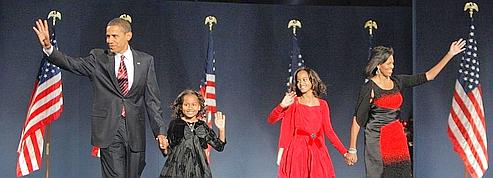 Aux USA, se présenter sur scène avec sa famille est très classieux. Mais l'émotionnel ne prend pas ailleurs sur la planète, où l'on subit depuis des décennies les missiles et bombardements économiques américains. Obama aura besoin d'un peu plus que de l'esbrouffe de vendeur de cravattes genre Tapie pour arriver à convaincre.
Aux USA, se présenter sur scène avec sa famille est très classieux. Mais l'émotionnel ne prend pas ailleurs sur la planète, où l'on subit depuis des décennies les missiles et bombardements économiques américains. Obama aura besoin d'un peu plus que de l'esbrouffe de vendeur de cravattes genre Tapie pour arriver à convaincre.
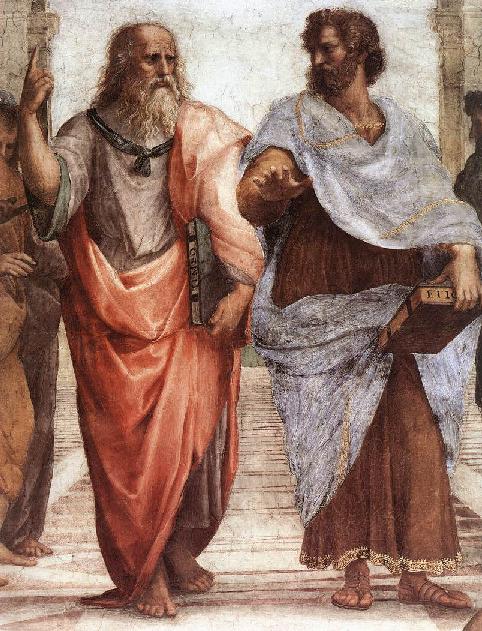
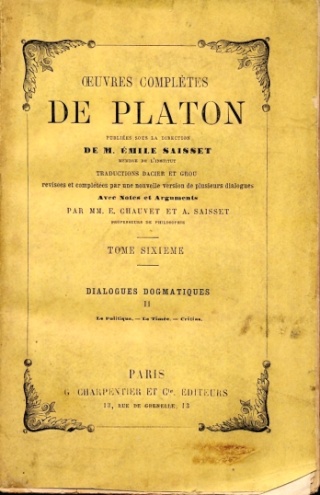



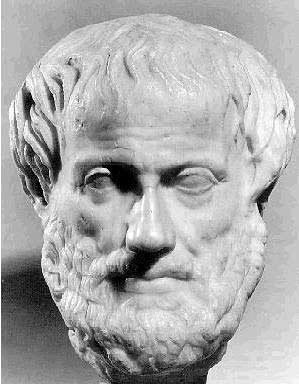
Aucun commentaire:
Enregistrer un commentaire